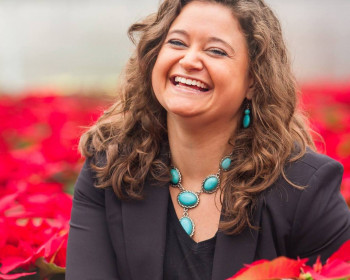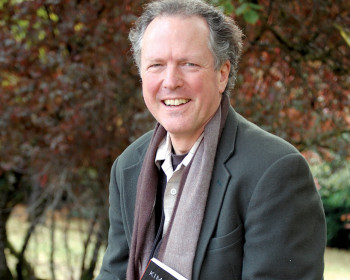Q&A: J. Maria Bermudez on feminism
Open gallery

Lewis & Clark Graduate School is thrilled to welcome J. Maria Bermudez, PhD, LMFT, Associate Professor of Marriage and Family Therapy and Human Development and Family Science at the University of Georgia, to campus this March. Her workshop, Feminism, Narrative Therapy, and Internal Family Systems in Action, will be held March 4th from 9 a.m.-4 p.m. in the South Chapel. Read more below about Maria and why she believes creativity and a feminist lens in narrative therapy can help support social justice.
“… as an immigrant, Latina, and a feminist, I have always felt compelled to advocate for those whose voices are marginalized or silenced.” - J. Maria Bermudez
What inspired you to focus your work on individual and family resilience among people from marginalized social positions?
I am originally from Honduras, which is one of the poorest countries in our hemisphere. We emigrated when I was a small child, but as an immigrant, Latina, and a feminist, I have always felt compelled to advocate for those whose voices are marginalized or silenced. As a researcher and therapist, my aim is to focus on strengths and resilience. A large portion of research focused on ethnic minorities and immigrants is problem saturated, and does not focus on the strengths and resiliency of people from marginalized groups.
How do therapeutic approaches like narrative therapy and internal family systems support social justice?
I think narrative therapy is most aligned with social justice. In this course, we will use the Internal Family Systems model to learn how to deconstruct parts of ourselves and discover how these parts work together to create problematic or preferred narratives. This creative process can help clients learn to be more self-aware, self-led, and feel in control.
How do creativity and experiential approaches to therapy improve the therapeutic process and outcomes?
So many possibilities can be explored in a creative process! Using creative and experiential approaches in therapy has been shown to use different parts of our brain, and helps us experience new insights. Experiential understanding affords people with the opportunity to discover new possibilities that they may not have known existed, merely through a dialogic process.
Whether a practitioner identifies as a feminist or not, why is it important for all clinicians to have an understanding of a feminist lens?
Learning more about feminist ideologies and frameworks can help counselors, therapists, teachers and any practitioner understand the systemic and structural forces that maintain power imbalances and social, systemic, and interpersonal inequality. Whether the therapist identifies as feminist or not, most therapists, teachers, or practitioners would agree that aspects of our identities and social location, such as gender, race, ability, religion, and socioeconomic status, can afford unequal privilege or experiences of oppression. Understanding these principles helps us work toward creating spaces and relationships that are just and equitable.
Have you offered workshops like the one you’re giving at Lewis & Clark? If so, what were the biggest takeaways from those?
Yes! I have presented this model several times in Mexico and in the States, and have co-authored a similar model in the Journal of Feminist Family Therapy. The biggest takeaway is that participants spend a day learning how to creatively explore different “parts of their personalities or selves” and learn how to help those parts work in better harmony and not clash or cause problems for the self. Participants find the workshop enjoyable and creative, as we will work with art supplies, but they also learn a theoretically based model to use with clients in their practice.
Is there anything else you’d like to share about yourself or your work, and how it intersects with the most pressing mental health needs of families and communities?
I have been in practice for over 20 years and I have published over 30 articles and book chapters, and have presented many times at national and international conferences. I especially have enjoyed my published work and presentations focused on the use of narrative therapy, creativity, and art as a means to help children, adults, couples and families re-author preferred narratives.
The process is just as rich as the outcome and that is very rewarding for me. I love to present and I find working with other professionals and students in this process always enriches me and advances my learning as well. Our workshop will definitely be engaging, creative, and personally and professionally meaningful.
Graduate Communications is located in room 205 of Rogers Hall on the Graduate Campus.
voice 503-768-6054
fax 503-768-6053
Graduate Communications
Lewis & Clark
615 S. Palatine Hill Road
Portland OR 97219

